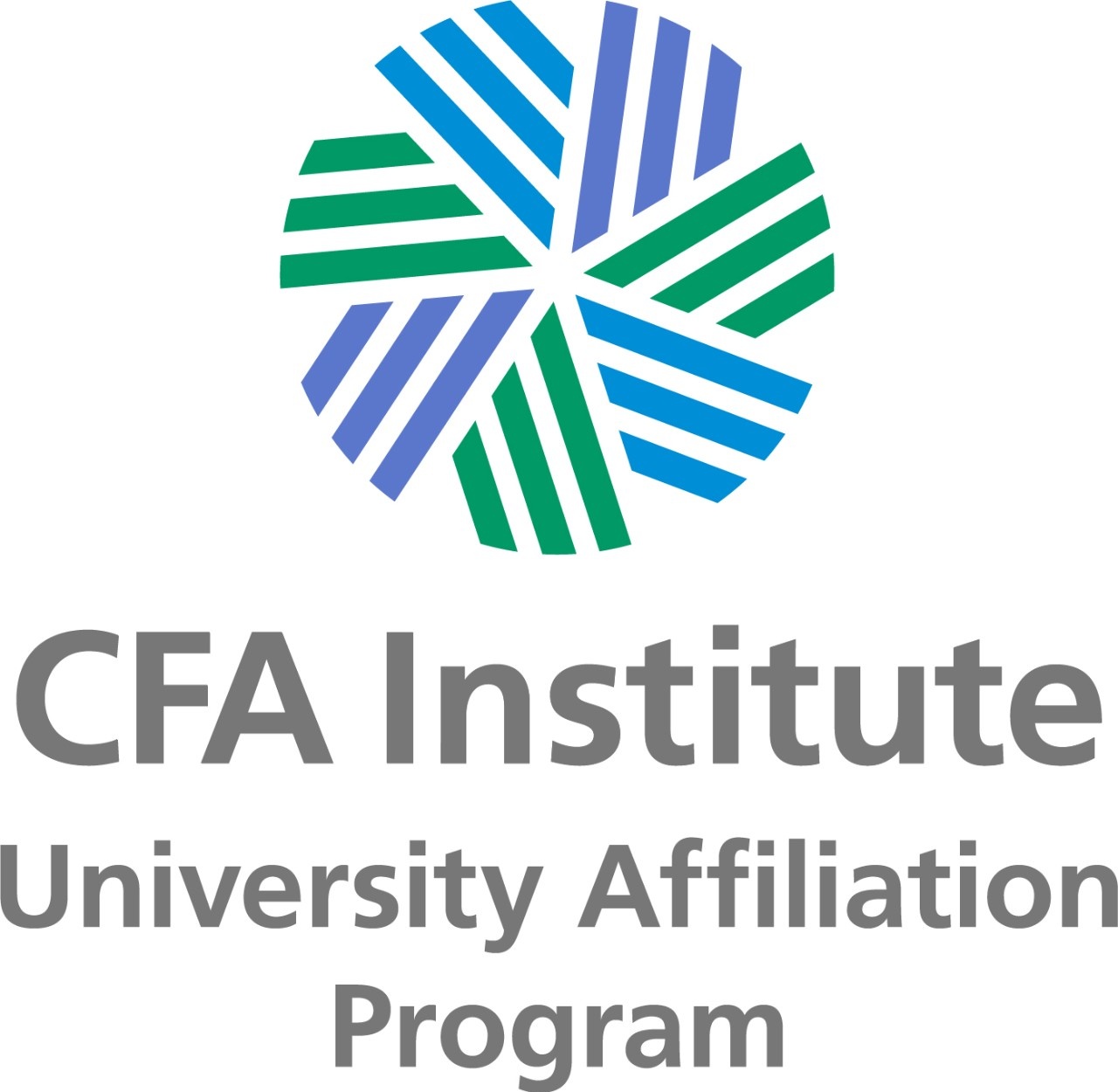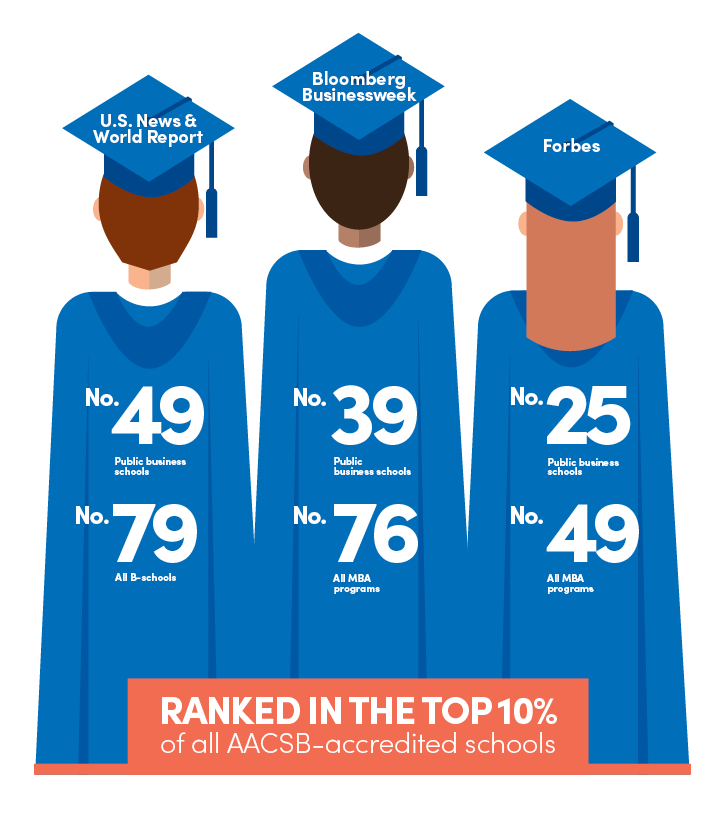Startups
On this page:
Ranked with the best
The School of Management fared well in three rankings released in the fall.
The school’s undergraduate business program is again one of the nation’s best, according to U.S. News & World Report. Among public business schools, the School of Management is ranked No. 49. Across all B-schools, the school is tied at No. 79, up eight spots from last year, and ranked higher than any other business school in the State University of New York system.
In Bloomberg Businessweek’s ranking of the nation’s best MBA programs, the school climbed another two places, coming in at No. 76. Among public universities, the school ranks No. 39 and, in the critical learning component of the survey, No. 38 overall, besting such schools as Harvard, Duke and NYU.
Forbes released its biennial MBA ranking and the School of Management placed No. 49 overall and No. 25 among publics for the return on investment it provides its graduates.
In all the rankings, the school is solidly in the top 10% of programs accredited by the prestigious AACSB International.
Photo: Tom Wolf
Dean joins leaders in call for immigration policy change
In October, School of Management Dean Paul Tesluk signed an open letter to U.S. policymakers in conjunction with a new white paper from the Graduate Management Admission Council, “Early Warning Signals: Winners and Losers in the Global Race for Talent.”
The report examines how high-skilled immigration fuels productivity and economic growth, the need to support mobility of talent to study and work across borders, and the critical role business schools play in flagging trends that will impact the wider economy.
Calling attention to the particular challenges the U.S. faces, 15 CEOs (including several School of Management alumni and CEOs from companies in the Buffalo Niagara region) and 55 business school deans signed the letter calling for a substantial change in the U.S. approach to high-skilled immigration. The letter expresses urgent concern that the U.S. does not have the talent it needs or the capacity to train enough people with these skills to remain competitive in a global economy.
According to Tesluk, international applications to School of Management graduate programs have declined by 66% since 2016, as regional companies look to recruit graduates for key jobs.
“Attracting these individuals is critical to our growth and competitiveness—as a region and as a nation,” he says. “We know high-skill immigration benefits the workforce and the global economy.”
In 2019, the United States experienced a 13.7% decrease in international business school applications—a steeper decline than any other country. Citing economic research and application data, the white paper looks at trends in the flow of talent to specific countries.
Because they attract highly skilled candidates, regions where students can study and work are likely to be economic development winners, which has implications for homegrown talent, as well, by creating hubs of innovation. Western New York is one such region, due in part to the important role of UB and the School of Management in attracting, educating and placing top students into companies.
Standing, from left: Marc A. Adler, Stuart H. Angert, John Scannell and Brandon D. Glasgow. Seated, from left: Judy Vredenburgh and Tamara B. Owen. Photo: Tom Wolf
Honoring alumni and business leaders for impact
This fall, the School of Management named the 2019 Buffalo Niagara Executive of the Year: John Scannell, chairman and CEO of Moog Inc., a worldwide designer, manufacturer and integrator of precision controls.
Scannell accepted the award at the 70th Annual School of Management Alumni Association Awards Banquet.
Established in 1949, the award is presented annually to an individual who resides in or has a major impact on the region, and whose career has been distinguished by executive success and civic leadership. Scannell was selected by a vote of past honorees and the alumni association board of directors, who praised him as a humble leader who brings diverse stakeholders together and has helped propel Moog’s steady growth during his tenure.
At the event, the school also honored the following alumni and business leaders:
- Marc A. Adler, MBA ’82, CEL ’08, president of Why Not Marketing, for his service to the School of Management
- Stuart H. Angert, founder and former CEO of Remarketing Services of America, for entrepreneurship
- Brandon D. Glasgow, MBA ’18, CEO of Scholar and a Dream, and senior consultant in the retail and consumer goods practice at Cognizant, for early career success
- Tamara B. Owen, EMBA ’02, president and CEO of Olmsted Center for Sight, for her service to the Western New York community
- Judy Vredenburgh, MBA ’75, past president and CEO of Girls Inc., for industry leadership.
Supply (chains) and demand
School relaunches master's degree program
With demand soaring for supply chain professionals, the School of Management will offer a specialized Master of Science in Operations and Supply Chain Management (MS OSCM) starting this fall.
According to a recent global study by DHL Supply Chain, 58% of operations and supply chain leaders had difficulty finding employees with both technical and soft skills. The MS OSCM program will deliver on both fronts, equipping students with advanced competencies in logistics, inventory planning and demand forecasting, as well as the project management and analytical skills to succeed in leadership roles.
The curriculum builds on the school’s previous MS in supply chains and operations management program, and allows students to target a career direction by choosing from five tracks: analytics, entrepreneurship, finance, health care and industry operations.
To address market trends, the revamped MS OSCM was updated with input from faculty experts, alumni and industry executives. Plus, as companies seek workers who can evaluate the environmental impact of operations and analyze data to improve performance, the program includes new core courses in sustainability and quantitative analysis.
Most students will graduate in two or three semesters, while working professionals can complete their degree at a slower pace by choosing the industry operations track, which offers online and evening classes. By commencement, all graduates will be ready to lead in such industries as aerospace and defense, automotive, consumer packaged goods, energy, freight and logistics, health care and manufacturing.
School of Management earns CFA Institute affiliation

The School of Management’s Master of Science in Finance degree has been accepted into the CFA Institute University Affiliation Program (UAP), in recognition of the curriculum’s focus on ethics and standards of practice. The CFA Institute is the global association of investment professionals that sets the standard for professional excellence and administers the industry gold standard CFA charter.
To earn entry into the UAP, finance programs must incorporate at least 70% of the CFA Program Candidate Body of Knowledge. Acceptance into the UAP signals the degree program is closely tied to professional practice and is well-suited to preparing students to sit for CFA examinations.
Survey says...
Our gratitude goes out to the many alumni who replied to our Buffalo Business survey in the fall. Your feedback enables us to continue to produce an award-winning publication that provides you with the content you enjoy, and we got some great ideas from your responses. Congratulations to Siddharth Khandelwal, BS ’16, of Lucknow, India (left), whose name was drawn as the lucky winner of School of Management swag, compliments of the School of Management Alumni Association.




